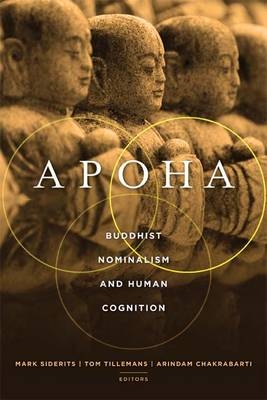
Apoha
Columbia University Press (Verlag)
978-0-231-15361-4 (ISBN)
- Lieferbar (Termin unbekannt)
- Versandkostenfrei
- Auch auf Rechnung
- Artikel merken
They show that the work of generations of Indian philosophers can add much toward the resolution of persistent conundrums in analytic philosophy and cognitive science.
Mark Siderits is professor of philosophy at Seoul National University and the author of Indian Philosophy of Language, Personal Identity and Buddhist Philosophy, and Buddhism as Philosophy. Tom Tillemans is professor of Buddhist studies at the University of Lausanne, Switzerland. His books include Scripture, Logic, Language: Essays on Dharmakirti and His Tibetan Successors.Arindam Chakrabarti is professor of philosophy at the University of Hawai'i. He is the author of Denying Existence: The Logic, Epistemology, and Pragmatics of Negative Existentials and Fictional Discourse.
Preface Introduction, by Arindam Chakrabarti and Mark Siderits 1. How to Talk About Ineffable Things: Dignaga and Dharmakirti on Apoha, by Tom Tillemans 2. Dignaga's Apoha Theory: Its Presuppositions and Main Theoretical Implications, by Ole Pind 3. Key Features of Dharmakirti's Apoha Theory, by John D. Dunne 4. Dharmakirti's Discussion of Circularity, by Pascale Hugon 5. Apoha Theory as an Approach to Understanding Human Cognition, by Shoryu Katsura 6. The Apoha Theory as Referred to in the Nyayamanjari, by Masaaki Hattori 7. Constructing the Content of Awareness Events, by Parimal G. Patil 8. The Apoha Theory of Meaning: A Critical Account, by Prabal Kumar Sen 9. Apoha as a Naturalized Account of Concept Formation, by Georges Dreyfus 10. Apoha, Feature-Placing, and Sensory Content, by Jonardon Ganeri 11. Funes and Categorization in an Abstraction-Free World, by Amita Chatterjee 12. Apoha Semantics: Some Simpleminded Questions and Doubts, by Bob Hale 13. Classical Semantics and Apoha Semantics, by Brendan S. Gillon 14. Srughna by Dusk, by Mark Siderits Bibliography List of Contributors Index
| Verlagsort | New York |
|---|---|
| Sprache | englisch |
| Maße | 152 x 229 mm |
| Themenwelt | Geisteswissenschaften ► Philosophie ► Östliche Philosophie |
| Geisteswissenschaften ► Philosophie ► Philosophie der Neuzeit | |
| Geisteswissenschaften ► Religion / Theologie | |
| ISBN-10 | 0-231-15361-9 / 0231153619 |
| ISBN-13 | 978-0-231-15361-4 / 9780231153614 |
| Zustand | Neuware |
| Haben Sie eine Frage zum Produkt? |
aus dem Bereich


